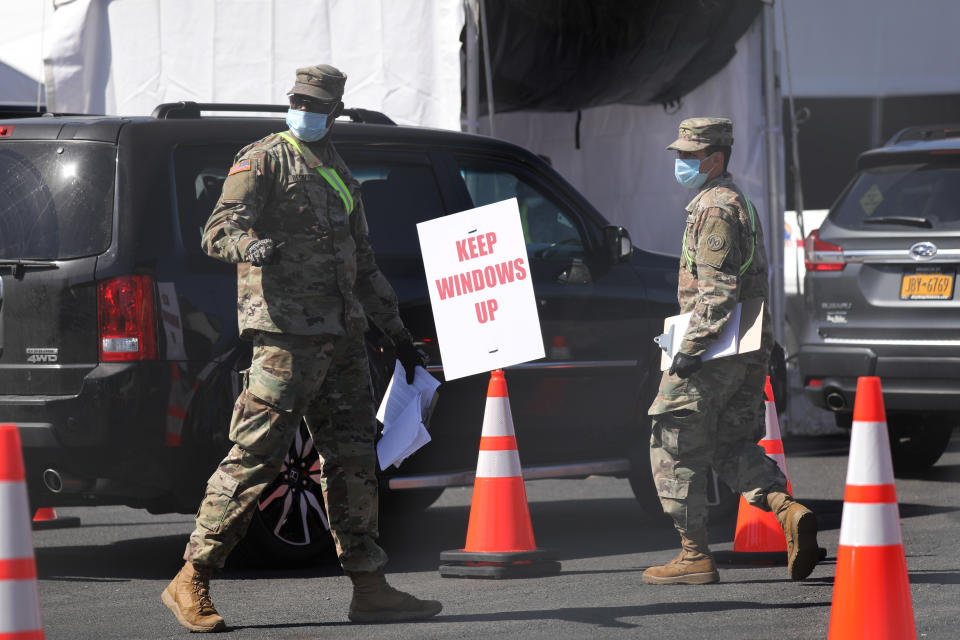This is when Trump can safely reopen the economy
President Trump’s latest deadline for reopening the economy is May 1. It won’t happen, and Trump is making a fundamental mistake by thinking a calendar date could be the trigger in the first place.
States and cities reeling from the coronavirus aren’t going to allow people back to work and risk further outbreaks until they know the virus is under control. And that’s not a function of time passing or some arbitrary date. It’s well known by now that controlling the virus requires widespread testing and massive new public health infrastructure to track all cases, everywhere. It’s doable, but Trump so far has shown little interest in doing what’s required.
If Trump wants a benchmark for when the economy can reopen, here’s one: at least 10 million coronavirus tests per day, and as many as 100 million per day in a worst-case scenario. That’s what two Microsoft researchers say will be required for the economy to get back to normal, in a paper published by Harvard’s Safra Center for Ethics. A vaccine will probably be available in 2021, but prior to that, the best we can do is a massive testing regime coupled with thorough contact tracing for anybody who tests positive. That’s the only way to know with confidence who’s infected and must be quarantined, and who can safely go to work and circulate in society.

We’re not remotely close to this level of testing. The United States has only conducted 2.8 million tests, total, since the end of February. We’ve recently hit a pace of around 150,000 tests per day, and that will continue to ramp up as tests produced by Abbott Labs and others hit the market. But the United States is behind the testing pace of other countries, and the rate of infections may be outpacing the increase in testing. “Testing capacity is currently the greatest limiting factor driving uncertainty relating to the spread of Covid-19 and when states could potentially relax social distancing measures,” Morgan Stanley analysts wrote in a recent report about how to restart the economy.
Until testing is commonplace enough to corral the spread of the virus, distancing measures that have closed thousands of businesses and sent millions of workers home remain the only default option.
Trump is quiet on testing
Testing on the scale required to contain the virus would be expensive. The Microsoft researchers estimate a cost of $5 billion to conduct 1 million tests per day, for 12 months. That includes lower costs for the test that would come from scaling. So 10 million tests would cost $50 billion, and 100 million tests, $500 billion. That’s a lot of money. Congress so far has required insurers to cover testing costs, but it hasn’t appropriated any money for a national testing program on the scale that is probably necessary.
Trump hasn’t said much about testing, either. As recently as late March, he said he wasn’t aware of any testing shortages—even though governors were telling the White House task force about shortages daily. Trump still hasn’t published his own plan for putting the public health measures in place that will allow businesses to gradually reopen, even though think tanks and research outlets have. Even Joe Biden, Trump’s likely Democratic opponent in the presidential election, has published a more detailed reopening plan than Trump has. A key point: “There needs to be widespread, easily available and prompt testing — and a contact tracing strategy that protects privacy.”

In its recent “prescription to get the U.S. back to work,” Morgan Stanley foresees a “slow return” after the U.S. caseload peaks, probably in late May. But that depends on a huge effort to test, track and map the disease, along with serology testing, which can determine who has developed antibodies to the virus and is likely to be immune.
Once those steps are in place, it will be governors—not Trump or any national figure—who decide if it’s safe to reopen businesses in their states and send workers back to the job. Morgan Stanley thinks up to half of all workers could return by the summer, though governors will be ready to invoke shutdowns again if the virus flares. Any new outbreaks would slow the return to normal—perhaps by a lot—which means it’s crucial to get testing and other public-health prerequisites in place before anything reopens. Dates are irrelevant.
Rick Newman is the author of four books, including “Rebounders: How Winners Pivot from Setback to Success.” Follow him on Twitter: @rickjnewman. Confidential tip line: [email protected]. Encrypted communication available. Click here to get Rick’s stories by email.
Read more:
Follow Yahoo Finance on Twitter, Facebook, Instagram, Flipboard, SmartNews, LinkedIn, YouTube, and reddit.
